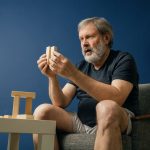Key Differences Between Believers and Atheist Moral Compasses
NODE SMITH, ND
A new study suggests that, while atheists and theists share moral values related to protecting vulnerable individuals, atheists are less likely to endorse values that promote group cohesion and more inclined to judge the morality of actions based on their consequences. Tomas Ståhl of the University of Illinois at Chicago presents these findings in the open-access journal PLOS ONE on February 24, 2021.
In many countries, including the U.S., widespread cultural beliefs hold that atheists lack a moral compass. However, no previous studies have systematically examined the differences between atheists’ and theists’ concepts of morality.
To address this gap, Ståhl conducted two surveys examining the moral values of 429 American atheists and theists via Amazon’s Mechanical Turk platform. He also conducted two larger surveys involving 4,193 atheists and theists from the U.S. (a predominantly religious country) and Sweden (a predominantly irreligious country).
Analysis of the results suggests that theists are more inclined than atheists to endorse moral values that promote group cohesion. Meanwhile, atheists are more likely to judge the morality of an action based on its consequences. However, atheists and theists appear to align on moral values related to protecting vulnerable individuals, liberty versus oppression, and being epistemically rational, i.e.: believing in claims when they are evidence-based and being skeptical about claims not backed by evidence.
The survey results also provided clues as to why atheists’ and theists’ moral compasses may be calibrated differently: the distinctions may stem in part from theists’ increased exposure to community engagement in belief-based behaviors that would be costly if the beliefs were false (such as attending religious meetings). Differences in cognitive style and levels of perceived existential threat may also contribute. Future studies could further explore these potential causal relationships.
These findings suggest that the widespread idea that atheists are immoral may arise in part from their weak endorsement of moral values that promote group cohesion and their consequence-based, case-by-case moral judgment of actions.
Ståhl adds: “The most general take-home message from these studies is that people who do not believe in God do have a moral compass. In fact, they share many of the same moral concerns that religious believers have, such as concerns about fairness, and about protecting vulnerable individuals from harm. However, disbelievers are less inclined than believers to endorse moral values that serve group cohesion, such as having respect for authorities, ingroup loyalty, and sanctity… It is possible that the negative stereotype of atheists as immoral may stem in part from the fact that they are less inclined than religious people to view respect for authority, ingroup loyalty, and sanctity as relevant for morality, and they are more likely to make moral judgments about harm on a consequentialist, case by case basis.”
1. Tomas Ståhl. The amoral atheist? A cross-national examination of cultural, motivational, and cognitive antecedents of disbelief, and their implications for morality. PLOS ONE, 2021; 16 (2): e0246593 DOI: 10.1371/journal.pone.0246593

Node Smith, ND, is a naturopathic physician in Humboldt, Saskatchewan and associate editor and continuing education director for NDNR. His mission is serving relationships that support the process of transformation, and that ultimately lead to healthier people, businesses and communities. His primary therapeutic tools include counselling, homeopathy, diet and the use of cold water combined with exercise. Node considers health to be a reflection of the relationships a person or a business has with themselves, with God and with those around them. In order to cure disease and to heal, these relationships must be specifically considered. Node has worked intimately with many groups and organizations within the naturopathic profession, and helped found the non-profit, Association for Naturopathic Revitalization (ANR), which works to promote and facilitate experiential education in vitalism.










